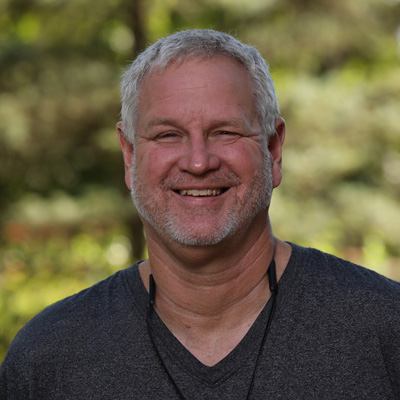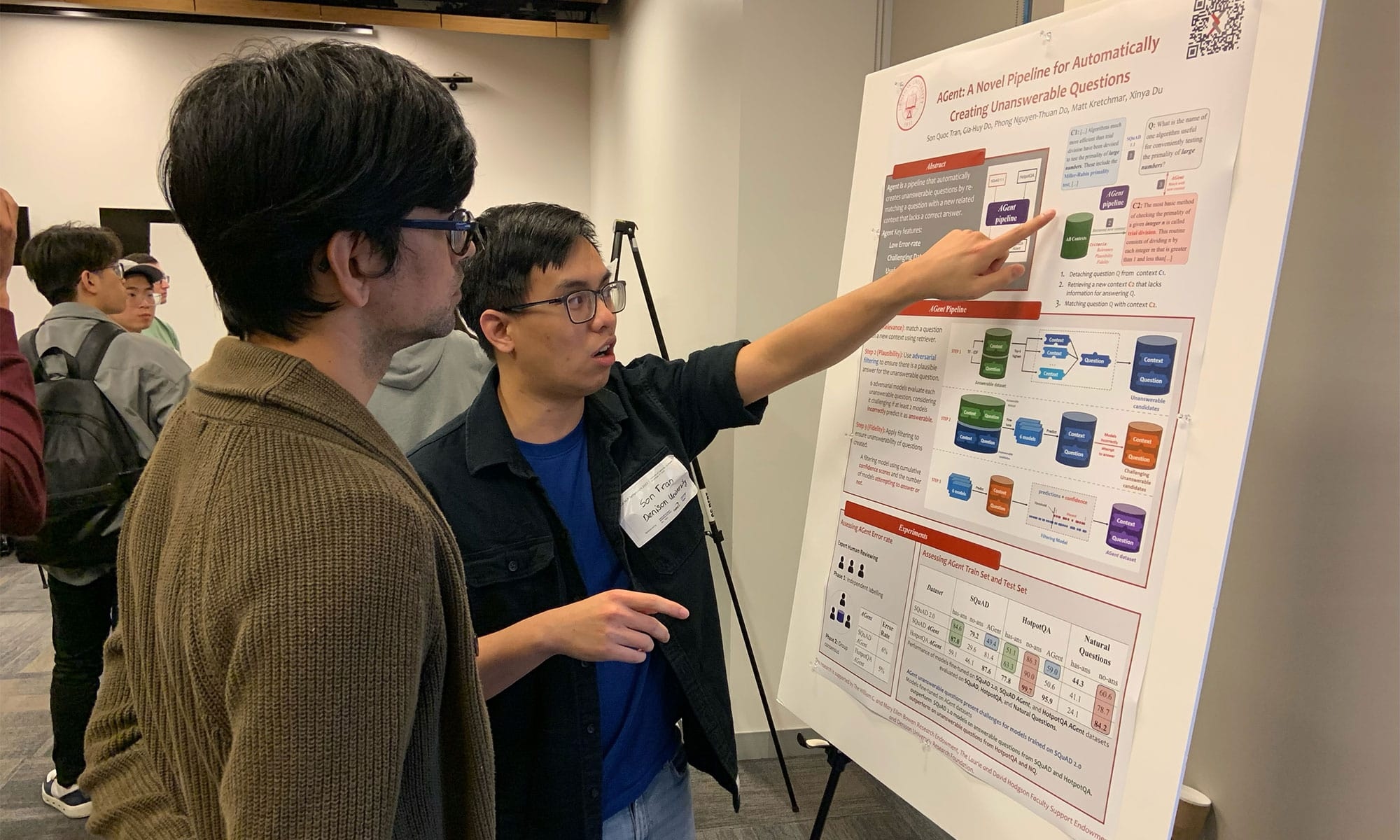The first visit from Son Tran ’24 to the office of professor Matt Kretchmar was unremarkable. The second was revelatory — a two-hour conversation that put a precocious pupil and willing professor on a course to scholarly adventure.
Kretchmar has taught computer science and mathematics at Denison since 1999. He’s lost count of how many students like Tran, brimming with enthusiasm and great intentions, have expressed interest in researching the field of artificial intelligence.
“It’s hard — it’s a deep discipline,” Kretchmar said. “It usually takes several years to get enough experience to do something meaningful.”
Not for Tran, who approached Kretchmar within his first few weeks on campus about doing work in the areas of machine learning and large language models.
The professor met briefly with the computer science major, encouraging him to write a research proposal, never expecting to see him within three days, a nine-page paper in hand. The authority in which it was written, and the comprehension of a complex subject, belied the student’s age.
Kretchmar and Tran talked at length, the student offering his analysis on research material he brought to the professor’s office. It was like listening to a young Mozart dissect musical composition.
Tran was just a sophomore — he spent his first year in his native Vietnam learning remotely because of the global pandemic — and had only developed an interest in AI in 2019.
“I could see instantly he understood this stuff at a very high level,” Kretchmar recalled. “He started showing me the coding projects he was working on, and it was, ‘Wow, this is not the usual smart student. This is the super smart Denison student.’”
The partnership formed that day has produced multiple scholarly works, including one accepted by the prestigious European Association of Computational Linguistics.
It’s rare for an undergraduate to co-author papers in AI scholarship, and nearly unprecedented to see the student emerge as the driving force in research. But it underscores the value of studying at a small liberal arts college and the willingness of Denison professors to give students the one-on-one attention necessary to achieve lofty goals.
“Matt is my adviser, my supervisor, my collaborator, and also the one who’s supported me unconditionally,” Tran said. “He’s the one who always believed in me.”
Denison’s advantage
Professor Ashwin Lall, chair of the computer science department, sat in his second-floor office in Olin Science Hall, discussing memories of being a postdoctoral researcher at a large American university.
“If you were a master’s student, you could try really hard to join a professor’s research team,” Lall said. “You would get to join meetings, but your interaction would be limited to Ph.D. students. For an undergraduate student to get in would be difficult, and direct contact with a faculty member would be almost impossible.”
Denison professors make time for enterprising students, and, in the case of Tran, Kretchmar essentially went back to school to acquire the expertise needed to guide him through the projects.
The field of artificial intelligence is broad and ever-changing. Books written on the subject can become outdated within weeks of publication.
Kretchmar’s area of expertise is reinforcement learning or learning through trial and error. To assist Tran, he had to immerse himself in the student’s specialty while maintaining his responsibilities to others.
The professor watched seminars on YouTube, he took an online course at Stanford University, and traveled to Seattle with Tran to attend a conference, a trip funded by Denison.
Usually, a professor tailors a research project around his academic strengths and chooses students accordingly. Tran could not believe Kretchmar was making such an exception.
“He was willing to go with me instead of making me go with him,” Tran said. “That was a surprise.”
Kretchmar was born into a world of academia. His father, R. Scott Kretchmar, is an emeritus professor of exercise and sports science at Penn State University. His grandfather, Bob Kretchmar, was a professor of physical education and a football and baseball coach at Oberlin College.
The Denison professor was raised to put the needs of students first. He’s also an ultra-endurance road bicycle racer, a competitor who admires those willing to log the hard miles. Kretchmar recognized these traits in Tran, whose quiet, unassuming nature masks a relentless desire to succeed.
The professor arranged independent studies for Tran and accepted him in back-to-back Summer Scholars programs. While Tran excelled in his area of expertise, Kretchmar provided years of AI-related experience. He acted as the guardrails that allowed his student to floor the accelerator.
In the spring of 2023, they were thrilled to learn their paper, “The Impacts of Unanswerable Questions on the Robustness of Machine Reading Comprehension Models,” had been accepted by the European Association of Computational Linguistics. Co-authors included Kretchmar, Phong Nguyen-Thuan Do, and Uyen Phuong Le ’24, but the professor cited Tran as the project leader.
Lall and Kretchmar marvel at Tran’s ability to write at a professional level in his second language.
“The fact they were able to work on a project that was not Matt’s specialty tells you how much of a driving force Son was,” Lall said. “It’s just incredible an undergraduate can think and work and produce papers at that level.”
‘AI chose me’
The Olin Science Hall classroom was empty on a summer afternoon in 2023 except for one student seated at a back table typing code into a new computer.
You can measure Tran’s investment in many ways. One is the $1,000 he spent to purchase a computer with a powerful graphic processing unit to perform rapid mathematical calculations.
“I did not choose AI,” Tran said. “AI chose me.”
Tran is the son of two high school science teachers in his hometown of Duc Pho, Vietnam. He has two sisters, a data analyst and a medical doctor. It’s a family humming with intellectual horsepower.
While taking a gap year after high school, Tran became fascinated with the technology behind Siri and Google Assistant. His curiosity led him into the world of AI.
Once at Denison, Tran committed to his studies. Like many international students, he had to adjust to cultural differences. He admits there were difficult spells, but he’s found a community of friends and professors like Kretchmar that have helped ease the transition.
On Saturday mornings, he likes to play soccer with his buddies. He’s also an avid reader, particularly the works of Vietnamese author Nguyen Nhat Anh.
“We have a close community here,” Tran said. “We can talk about what we are trying to do. Most of my friends know what I’m trying to do, and I know what their goals in life are.”
Kretchmar is more than a professor and a collaborator to Tran. He’s also a mentor. He often speaks to the student about the importance of occasionally getting out from behind the computer screen.
“Son has an insane work ethic,” Kretchmar said. “I’ve talked to him about work-life balance, trying to get him to relax a little.”
Rewarding journey
In the autumn of 2023, professor and pupil set sail for another scholarly adventure. They traveled to Los Angeles, where two of their AI-related papers were accepted at the Southern California NLP Symposium.
It’s milestone moments like these when Kretchmar steps back and appreciates the trail Tran is blazing.
“We’ve had plenty of students publish their work, but usually by the time they develop the expertise in the field their time is wrapping up at Denison,” Kretchmar said. “What makes this so different is Son came to me with the expertise and the ideas. He was able to do this work right away as a sophomore. You can see the growth. He’s essentially functioning as a grad student right now.”
The professor estimates Tran will co-author five papers by the time he graduates. Each one has grown more sophisticated and larger in scope. And because machine learning is becoming a dominant field in AI, Kretchmar is better prepared to teach it to other students.
While Denison faculty rave about Tran’s prolific body of undergraduate work, the student is more excited about the process.
“The papers aren’t the reward, it’s the work itself,” Tran said. “I really enjoy working with this problem. I’m doing something I want to do for the next 20 or 30 years. I feel like the whole journey until now is the reward.”
The next stop is graduate school. The ultimate goal, Tran said, is to become a professor like the one who’s always believed in him and put him in a position to succeed.
“My father wants to meet Professor Kretchmar,” Tran said. “My parents have seen how I’ve matured in my time at Denison with him.”









